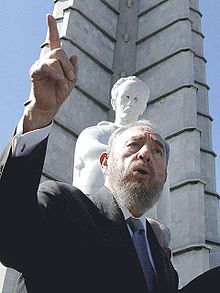Castroism
The political system established under the leadership of Fidel Castro in Cuba after the victory of the Cuban revolution from 1959 onwards is sometimes referred to as Castroism , Castro-Communism or Castrism , which is primarily characterized by "extremely centralized leadership in a very strong state". Fidel Castro is at the center of this policy. His speeches became the ideological guideline.
However, the Cuban leadership has never adopted the term, which implies the identification of the Cuban political system with the person of the revolutionary leader.
Ideologically, the political system built up by Castro relied on the tradition of the Cuban national hero of the independence movement José Martí and, from 1961, explicitly on Marxism-Leninism in particular, emphasizing different principles as decisive at different times. Since Fidel Castro's younger brother Raúl took over management responsibility for health reasons in July 2006, observers have pointed out the politically significant differences between the decades-long companions and have also used the terms “fidelism”, “post-fidelism” and “raulism” in this context official Cuban sources emphasize continuity in the political system.
Structurally, the 1959 built in Cuba state institutions and the leadership assumed oriented mass organizations closely the model of the under Josef Stalin developed, highly hierarchical one-party system of the Soviet Union , which from the end of World War II until 1989, especially in the socialist medium - and Eastern European countries. The political reference to the Soviet Union was particularly pronounced in the 1970s and 1980s. In the early years of the revolution, the Cuban leadership pursued a course that was more independent from Moscow, which included in particular the direct support of revolutionary guerrilla movements in Latin America and Africa - this policy was then seen by observers as a core element of "Castroism" and, with reference to Ernesto Guevara, in part also as "Castroism-Guevarism" called.
In Latin America, the Venezuelan President Hugo Chávez was the greatest admirer and most important supporter of the Cuban system that the Castro brothers had built.

literature
- Régis Debray : Castrism. The long march of Latin America . In: Régis Debray, Fidel Castro, Gisela Mandel and KS Karol (eds.): The long march: ways of revolution in Latin America . Trikont, Munich 1968
- Theodore Draper: Castroism: Theory and Practice. Praeger, New York 1965
- Samuel Farber : Cuba since the Revolution of 1959. A Critical Assessment . Haymarket, Chicago 2011, ISBN 978-1-60846-139-4
- Boris Goldenberg : The Cuban Revolution and Castrism. In: Boris Goldenberg and Klaus Eßer: Ten Years of the Cuban Revolution. Verlag für Literatur und Zeitgeschehen, Hannover 1969, special issue 4 of the journal Vierteljahresberichte of the research institute of the Friedrich-Ebert-Stiftung , pp. 7–85
- Albrecht Hagemann: Fidel Castro . Deutscher Taschenbuch Verlag, Munich 2002, ISBN 3-423-31057-X .
- Robert F. Lamberg: The Castristian guerrillas in Latin America - theory and practice of a revolutionary model . Publishing house for literature and current events, Hanover 1971 (quarterly reports / research institute of the Friedrich-Ebert-Stiftung. Special issue 7).
- Michael Zeuske : A Brief History of Cuba . CH Beck 2007, ISBN 9783406494222 , pp. 198, 221, 227, 230, 233-234 ( excerpt in the Google book search).
Web links
- Michael Zeuske: Traditions, Present and Future of the Cuban Revolution ( Memento from October 15, 2010 in the Internet Archive ). In: From Politics and Contemporary History . No. 41–42 / October 11, 2010 - Supplement: Revolutions in Latin America ( BPB material )
- Reinaldo Escobar: The hour of birth of fidelism in: Die Tageszeitung from August 4, 2006, accessed on June 11, 2012
Individual evidence
- ↑ Michael Zeuske: Traditions, Present and Future of the Cuban Revolution ( Memento of the original from October 15, 2010 in the Internet Archive ) Info: The archive link was inserted automatically and has not yet been checked. Please check the original and archive link according to the instructions and then remove this notice. . In: From Politics and Contemporary History . No. 41–42 / October 11, 2010 - Supplement: Revolutions in Latin America ( BPB material )
- ^ Bert Hoffmann: Cuba. 3rd edition, Verlag CH Beck, 2009, p. 87
- ^ Ernst Halperin: Dissatisfied Castro. View to Moscow: Big brother holds back in: Die Zeit of April 27, 1962, accessed on June 9, 2012
- ↑ Jaime Suchlicki: Cuba transition from Fidelismo to Raulismo in: Miami Herald of August 24, 2006, accessed via Havana Journal on June 11, 2012 (English)
- ^ Philipp Lichterbeck: Kuba: Castro corrects Castro in: Der Tagesspiegel from March 4, 2009, accessed on June 11, 2012
- ^ Raúl Castro: Central Report to the 6th Congress of the Communist Party of Cuba in: Cubadebate of April 16, 2011, accessed on June 11, 2012 (English)
- ^ Samuel Farber: Cuba: The Unity of the People in: Havana Times of December 4, 2011 (excerpt from the book Cuba since the Revolution of 1959 ), accessed on June 9, 2012 (English)
- ↑ Heinz Dieterich: La Des-Fidelización de Cuba ( Memento of the original from December 16, 2012 in the Internet Archive ) Info: The archive link was inserted automatically and has not yet been checked. Please check the original and archive link according to the instructions and then remove this notice. in: Analítica of September 20, 2011, accessed June 9, 2012 (Spanish)
- ^ Bill Vann : Fidel Castro and Petit-Bourgeois Nationalist Politics , lecture January 7, 1998, in: World Socialist Web Site , accessed November 30, 2016.
- ↑ Wolfgang Berner: The Evangelist of Castroism-Guevarism , in: Reports of the Federal Institute for Eastern Studies and International Studies 1968